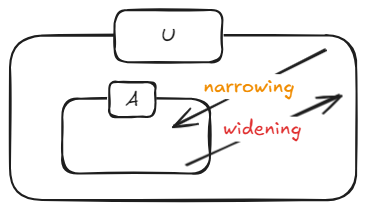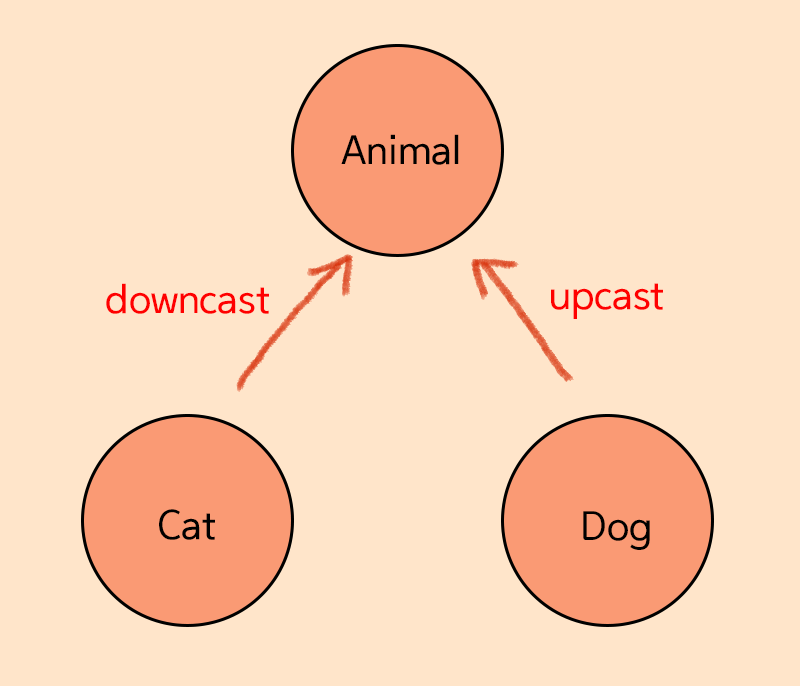
Type conversion
서로 다른 자료의 형태를 맞춰주는 것으로, 암묵적(implicit), 명시적(explicit) 형변환(conversion) 이 존재한다.

Implicit (widening) conversion
widening conversion : 서로 다른 자료형 중 더 큰 범위(int -> float)로 변환이 일어나는 것
- 대부분의 언어는 implicit conversion으로 widening conversion 방식을 지원, C++도 마찬가지
- conversion을 인정하지 않는 경우(strong typing)도 있음
- 명시적 생성(explicit construction) : {}을 이용한 선언(
<type><var> {value})이 대표적 - 단 {}을 이용한 선언은 배열 선언과 주의(특히 auto 선언)
int i = 1.0; // ok, int int i {1.0}; // error int i = {1.0}; // error auto array = {1.0}; // array type
- 명시적 생성(explicit construction) : {}을 이용한 선언(
정렬 순서 :
char<unsigned char<short<unsigned short<int
<unsigned int<long<unsigned long<float<double<long long<unsigned long <long<bool<wchar_t
- 다만 implicit conversion의 경우 type 변환 외의 동작은 정의하지 않기 때문에 사용에 주의해야함
#include <iostream>
#include <typeinfo> // typeid()
int main() {
int i = 5;
float f = 5.0f;
float one1, one2;
one1 = i / 4;
one2 = f / 4;
std::cout << "\n 결과 : " << one1 << "\t/ one1 type : " << typeid(one1).name() << "\n"; //(int)자동형변환
std::cout << " 결과 : " << one2 << "\t/ one2 type : " << typeid(one2).name() << std::endl;
return 0;
}
---
결과 : 1 / one1 type : f
결과 : 1.25 / one2 type : f
- one 1 : int/int 실행 결과로 소숫점 이하 버린 후 형변환, 즉 연산 후 형변환이 이루어짐
- one 2 : float/int -> float/float로 widening conversion 후 연산
C-type type conversion
(T) value
int i = (int)3.141592; //c-style
- 문법이 간결하나 어떤 변환인지 알기 어려움
C++-type conversion
static_cast,const_cast,dynamic_cast,reinterpret_cast
static_cast<new_type>(value); ///< 형변환 방법을 컴파일러가 아는 경우
const_cast<new_type>(value); ///< 일시적으로 const 지정 또는 해제
reinterpret_cast<new_type>(value); ///< 자료를 재해석하여 형변환하는 것으로 주로 포인터형에 사용
dynamic_cast<new_type>(value); ///< 상속 관계 중 다형성을 사용할 수 있는 경우 up, down 형변환
- static_cast : 일반적인 type 형변환, primary data type에 사용
- const_cast :
volatile및__unaligned특성을 제거하기 위해 사용 - dynamic_cast : scope 및 virtual table 설정, 다형 형식의 변환에 사용
- reinterpret_cast : 비트의 간단한 재해석에 사용
이건 잘 모르겠다
용어
형변환이 가능한지, 혹은 의도대로 변환이 되었는지 확인하기 위해서는 type 확인이 필요하다. 또한 c-base 언어는 인식과는 달리 에러 검출이 엄격한 언어가 아니다. 따라서 run-time 에러 및 오류에 관해 인지를 할 필요가 있다.
Typeinfo
type_info 클래스는 컴파일러가 프로그램 내에서 생성된 형식 정보를 설명
- 헤더파일 <typeinfo> 필요
class type_info { public: type_info(const type_info& rhs) = delete; // cannot be copied virtual ~type_info(); size_t hash_code() const; _CRTIMP_PURE bool operator==(const type_info& rhs) const; type_info& operator=(const type_info& rhs) = delete; // cannot be copied _CRTIMP_PURE bool operator!=(const type_info& rhs) const; _CRTIMP_PURE int before(const type_info& rhs) const; size_t hash_code() const noexcept; _CRTIMP_PURE const char* name() const; _CRTIMP_PURE const char* raw_name() const; }; - 프라이빗 복사 생성자만 존재 : 직접 인스턴스화 불가
- operator 지원 :
==,!= typeid(var).name(): type의 형태 반환(i, f, …)typeid(var).raw_name(): name과 비슷하나 사람이 읽을 수 있는 형식은 아니며 비교 시 사용하며 속도가 빠름.typeid(<var1>).bafore(typeid(<var2>))- 정렬순서, 상속 관계 반환
- 단 is-a 관계가 아닌 일반 클래스나 구조체 등은 결과를 보장할 수 없음
typeid(long).before(typeid(bool)) // 1 typeid(bool).before(typeid(long)) // 0
Undefined Behavior
C++표준 방식에서 금지한 방식. compile-time에서 error 없이 통과되나 run-time에 어떤 방식으로 작동할 지 예측 불가능한 상태.
단순히 run-time에 에러나 오류를 발생(시키면 차라리 좋을텐데)하지 않으며, 상황에 따라 정상적으로 혹은 의도하지 않은 동작을 할 수 있다는 가능성이 있다는 점에서 매우 까다롭다.
- 예측 불가능한 결과
- 메모리 손상
- 이상한 값 출력
- 프로그램이 멀쩡히 돌아가는 것처럼 보이다가 나중에 망가짐
- 보안 취약점 발생
- 기타 등등
- 여튼 안좋음
C++ type conversion
static_conversion
일반적인 type 형변환, primary data type에 사용.
사용자 정의 자료형 형변환의 경우operator conversion_type() { ... }를 통해 형변환 방법을 정의해야 한다.
static_cast<type>(var)(이때 <>는 실제 기호임)- 기본 자료형 형변환
double dValue = 3.141592; int nValue = 0; nValue = static_cast<int>(dValue); - 사용자 정의 형변환
#include <bits/stdc++.h>
struct Double;
struct Int {
Int(){}
Int(int n) : value(n) {}
int value = 0;
operator Double();
};
std::ostream& operator<<(std::ostream& os, const Int& n) {
os << n.value;
return os;
}
struct Double {
Double(){}
Double(double d) : value(d) {}
double value = 0.;
operator Int();
};
Int::operator Double() { return static_cast<double>(value); }
Double::operator Int() { return static_cast<int>(value); }
std::ostream& operator<<(std::ostream& os, const Double& d) { os << d.value; return os; }
using namespace std;
int main() {
Int n(1234);
Double d(3.14);
cout << n << ',' << d << '\n';
n = d;
d = static_cast<Double>(n);
cout << n << ',' << d << '\n';
}
---
1234,3.14
3,3
const_conversion
클래스에서
const,volatile및__unaligned특성을 제거
- const로 취급되는 함수나 원본이 const가 아닌 reference를 변경할 시 사용
- 단 const_conversion 캐스팅 이후 동작은 추적하지 않으므로 주의가 필요
#include <iostream>
struct type {
int i;
type(): i(3) {}
void f(int v) const {
// this->i = v; // compile error: this is a pointer to const
const_cast<type*>(this)->i = v; // OK as long as the type object isn't const
}
};
int main()
{
int i = 3; // i is not declared const
const int& rci = i;
const_cast<int&>(rci) = 4; // OK: modifies i
std::cout << "i = " << i << '\n';
type t; // if this was const type t, then t.f(4) would be undefined behavior
t.f(4);
std::cout << "type::i = " << t.i << '\n';
const int j = 3; // j is declared const
[[maybe_unused]]
int* pj = const_cast<int*>(&j);
// *pj = 4; // undefined behavior
[[maybe_unused]]
void (type::* pmf)(int) const = &type::f; // pointer to member function
// const_cast<void(type::*)(int)>(pmf); // compile error: const_cast does
// not work on function pointers
}
- const 함수는 2가지 특징을 가짐
- 내부에서 변수 변경 불가
- const로 지정된 함수만 호출 가능
this->i = v: const 함수인 f의 포인터 this -> 변경불가const_cast<type*>(this)->i = v: 일시적으로 변경 가능 상태. 단 type은 const이면 안됨
const_cast<int&>(rci) = 4const int& rci = irci는 const이나 rci의 원본 i는 const가 아니므로 변환 가능
int* pj = const_cast<int*>(&j)- j는 변경 불가이므로 포인트 할당
int* pj = j불가 - const_cast로 const 일시 해제
- 이후
*pj = 4실행 시 오류가 발생하지 않으나 const인 j 변수를 바꾸는 행위(UB)이므로 매우 위험
- j는 변경 불가이므로 포인트 할당
dynamic_conversion
- RTTI(RunTime Type Information) : 프로그램 실행 중에 개체의 형식이 결정될 수 있도록 하는 메커니즘
- 객체의 다형성은 run-time에 의해 결정되므로 RTTI 사용
- 하지만 구글 C++ 스타일 가이드 및 많은 C++ 프로젝트에서 사용을 금하고 있음
- 따라서 대략적인 개념만 이해하고 자세하게 설명하진 않을 예정
up/downcast

출처: https://nybot-house.tistory.com/66
- Upcast: Derived(Child) 클래스에서 Base(Parent) 클래스로 변환하는 것 , 즉 상위클래스로 변환
- Downcast: Base(Parent) 클래스에서 Derived(Child) 클래스로 내려 변환하는 것, 즉 하위클래스로 변환
Downcast
클래스의 implicit방식의 upcast는 허용되나 downcast는 허용하지 않음(compile error). 즉 dynamic_conversion은 downcast를 위한 형변환.
- dynamic_cast 불가 시 nullptr 반환
Parent* pPtr = new Child()
Child* cPtr = dynamic_cast<Child*>(pPtr); // Child Ptr 혹은 nullptr(변환 불가 시) 반환
if(cPtr == nullptr);
- 상위 클래스에서 하위 클래스를 참고(scope)할 수 없음
- 위 기능을 사용하기 위해 dynamic_cast 사용
- static_cast를 통해서도 가능하나 매우 위험한 방식
- 다음과 같은 예시가 있을 때
- parent (상위 클래스), child (하위 클래스), virtual (오버로드된 멤버 함수), sub_func (하위 클래스에서만 정의된 함수)
pPtr->virual(); // Child::virtual()
pPtr->sub_func(); // error, scope 불가
cPtr->sub_func(); // Child::virual()
C
Contents

